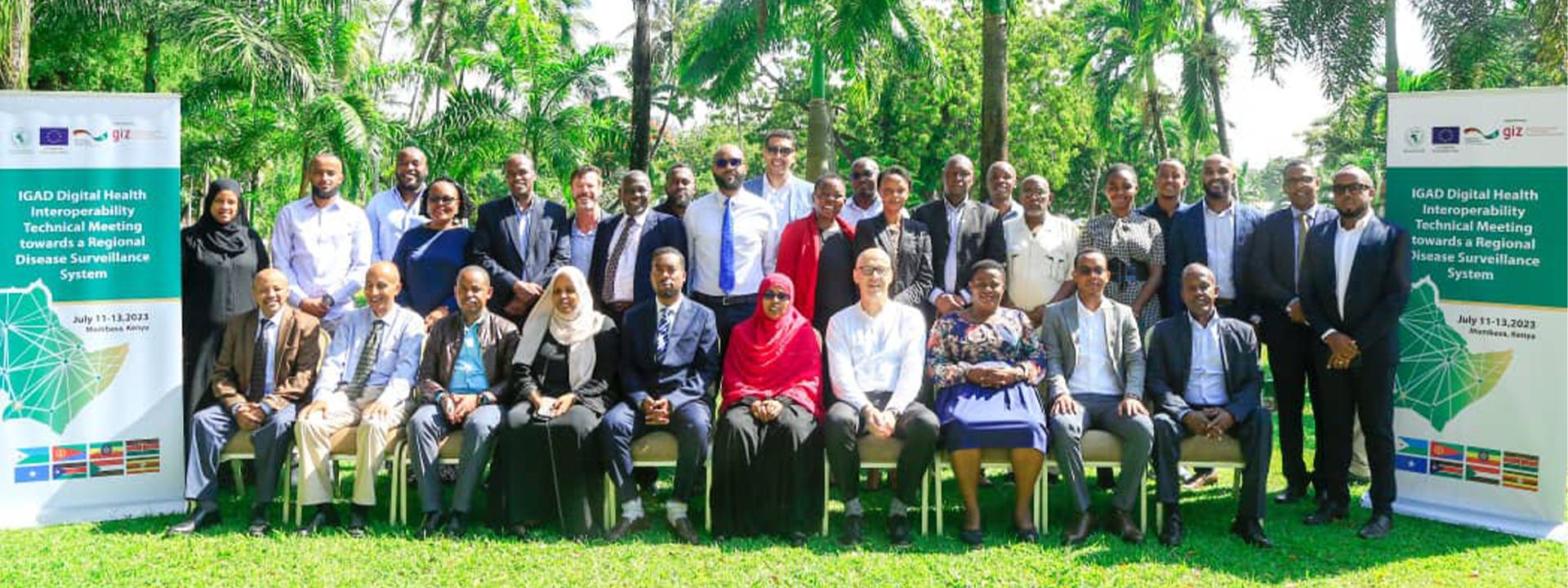July 11, 2023 (MOMBASA, Kenya): Health Experts in the fields of Integrated Diseases Surveillance and Response (IDSR) and Health Management Information Systems (HMIS) from Member States of the Inter-Governmental Authority on Development (IGAD) this morning commenced an extensive discussion on digital interoperability through the sharing of current health indicators, protocols and standards for data integration and other data to be shared with IGAD towards a Regional Disease Surveillance System.
Recognizing the importance of interoperability standards in digital health transformation, IGAD Member States and partners are in support of the adoption of open interoperability standards which is critical regionally thus requiring consistent representation of data and information in health. This consistency will allow various digital health solutions to seamlessly communicate and exchange information, enabling and supporting continuity of health data from community, national and regional levels of the health system to enable evidence-based regional responses on regional health emergencies, epidemics or pandemics.
The opening was officiated by Dr. Fatuma Adan, the IGAD Head of Mission to Kenya representing the Executive Secretary and Director of Health and Social Development highlighted that IGAD’s agenda of strengthening health data systems within its Member States for a regional Disease Surveillance System with the aim of helping the Region in mitigating the disease burden as well as understand and prepare for future health emergencies, health threats and pandemics.
“The meeting sessions aims at harmonizing public health policies with the latest technological innovations to achieve seamless, secure, and efficient data sharing that will make for evidence based decision-making interventions and we express our gratitude to the Member States, the European Union, BMZ-German Cooperation and GIZ for partnering with us in these efforts” Dr. Adan added.
On behalf of the IGAD Chair – Djibouti, Mr. Nouh Said Wais, Director of the Centre of Prevention and Health Education (Yonis Toussaint) expressed their commitment towards the improvement and advancement of health data sharing for better disease monitoring, surveillance and response as a region to the benefit of all IGAD citizens.
“By coordinating as Member States and pooling our resources, we can indeed establish a solid and reliable architecture of health data sharing platform, which will in return contribute to the improvement of our health systems’ Mr. Wais emphasized.
On behalf of GIZ, Mr. Jochen Schmidt; Head of Component – Digital Health, emphasized that strong alliances and partnerships lead to stronger results. “With IGAD’s excellent project coordination, the European Union’s generous support, and GIZ’s continuous dedication to implementing digital health strategies, we are at the forefront of innovative health solutions. Our collective mission goes beyond combating health challenges. It’s about turning them into opportunities for growth and resilience. This successful synergy paves the way for a healthier, robust Africa, equipped to navigate the changing landscapes of disease and healthcare” Mr. Schmidt added.
Digital interoperability will give the IGAD Member States the ability to use disparate platforms and systems to freely connect and communicate within the digitally integrated health ecosystem, regardless of organizational, national and regional boundaries.
During the 3-day meeting the Member States will also present their national IDSR systems including the previously agreed upon IDSR indicators, frequency of data collection, implementation status, lessons learned and challenges for a learning-sharing experience thus providing key recommendations for the finalization of standards, protocols and indicators of data to be shared by Member States to IGAD.
The IGAD Digital Health Project is mandated to oversee the implementation of the IGAD Health Data Sharing and Protection Policy Framework, which was endorsed by the IGAD Ministers Council in March 2022. The Project is financially supported by the European Union and BMZ (German Cooperation), coordinated by IGAD and implemented by GIZ.

